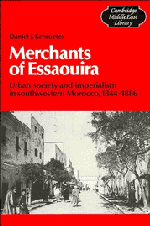Book contents
- Frontmatter
- Contents
- List of illustrations
- Map 1 General map of Morocco
- Preface
- Notes on usage
- Abbreviations
- Chronology
- 1 Introduction
- 2 The royal port
- 3 Merchants of the Sultan
- 4 Port and bazaar
- 5 Beyond the walls
- 6 The politics of trade
- 7 Foreign intervention and domestic reforms
- 8 The struggle for the southwest
- 9 The people of Essaouira in precolonial times
- 10 The end of an era
- Appendix A Corcos collection: nineteenth-century Arabic documents (1843–83)
- Appendix B Population estimates of Essaouira
- Appendix C Balancing revenue and expenditure: accounts of the port
- Appendix D Trade statistics for Essaouira
- Notes
- Bibliography
- Index
9 - The people of Essaouira in precolonial times
Published online by Cambridge University Press: 04 August 2010
- Frontmatter
- Contents
- List of illustrations
- Map 1 General map of Morocco
- Preface
- Notes on usage
- Abbreviations
- Chronology
- 1 Introduction
- 2 The royal port
- 3 Merchants of the Sultan
- 4 Port and bazaar
- 5 Beyond the walls
- 6 The politics of trade
- 7 Foreign intervention and domestic reforms
- 8 The struggle for the southwest
- 9 The people of Essaouira in precolonial times
- 10 The end of an era
- Appendix A Corcos collection: nineteenth-century Arabic documents (1843–83)
- Appendix B Population estimates of Essaouira
- Appendix C Balancing revenue and expenditure: accounts of the port
- Appendix D Trade statistics for Essaouira
- Notes
- Bibliography
- Index
Summary
The people of Essaouira in the latter half of the nineteenth century were affected by dramatic forces which were changing Moroccan society as a whole. Some of these forces, such as war and economic penetration, were of foreign origin, while others, such as the expansion of governmental powers and new kinds of taxes, originated within Morocco itself. But no force was as important as the dramatic recurrence of natural calamities. Seen in conjunction with other events of the nineteenth century, these natural disasters take on new dimensions.
Urbanization, and in particular, urbanization in the coastal towns, has been seen as a major consequence of Morocco's contact with Europe in the nineteenth century. Most striking of all was the increased number of Jews. Miège estimates that the Jewish population on the coast grew from 19,900 in 1832–6, to 24,800 in 1856–7, 31,000 in 1866–7, and to about 38,000 in 1900. The absence of any census and the contradictions in foreign estimates, make these figures unreliable. Nevertheless, there was clearly a steady, though not dramatic, rise in the Jewish population in coastal towns. From the mid-nineteenth century onward, large numbers of Jews, particularly from the Sous, settled in Essaouira. It can be determined tentatively that the Jewish population grew from about 4,000 out of a total population of 12,000 in 1844, to 7,000 out of 14,000 in 1875, and then slowly climbed to about 8,000 out of a total of 18,000 inhabitants towards the end of the century (see app. B).
- Type
- Chapter
- Information
- Merchants of EssaouiraUrban Society and Imperialism in Southwestern Morocco, 1844–1886, pp. 196 - 208Publisher: Cambridge University PressPrint publication year: 1988



